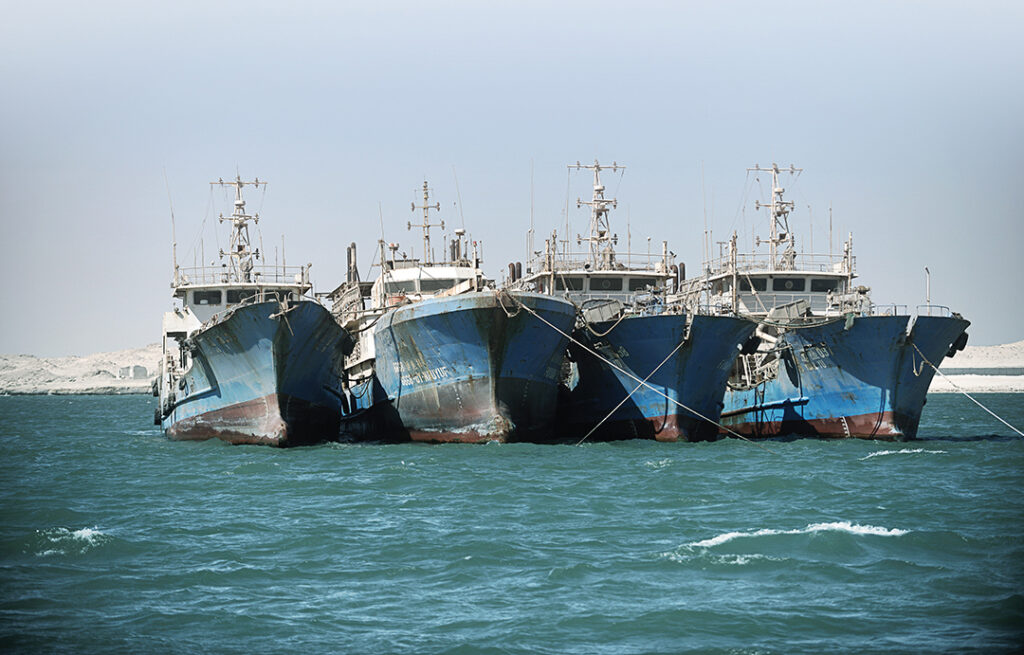ADF STAFF
The city of Nouadhibou, Mauritania, dangles from the mainland on a tiny peninsula. The city, the second largest in the nation, has nearly 120,000 residents and is a commercial center.
Its harbor is the terminus of the Mauritania Railway line, which hugs the border with Western Sahara for more than half of its transnational length. But the railroad is not the only major infrastructure development in the city. Now Nouadhibou is home to a sprawling port, financed and modernized by a Chinese company, and just one in a series of Belt and Road Initiative (BRI) projects emerging in Africa and elsewhere worldwide.
The project is a clear example of the link between China’s BRI and its distant-water fishing fleet (DWF) and how that link embeds Chinese maritime influence far from home, according to a video by the Center for Strategic and International Studies (CSIS). The port work, financed by China’s Poly Hong Dong Fishery Co. with more than $100 million in investment, hosts large industrial vessels that can scoop up significantly more fish than can the area’s small artisanal fishing canoes.
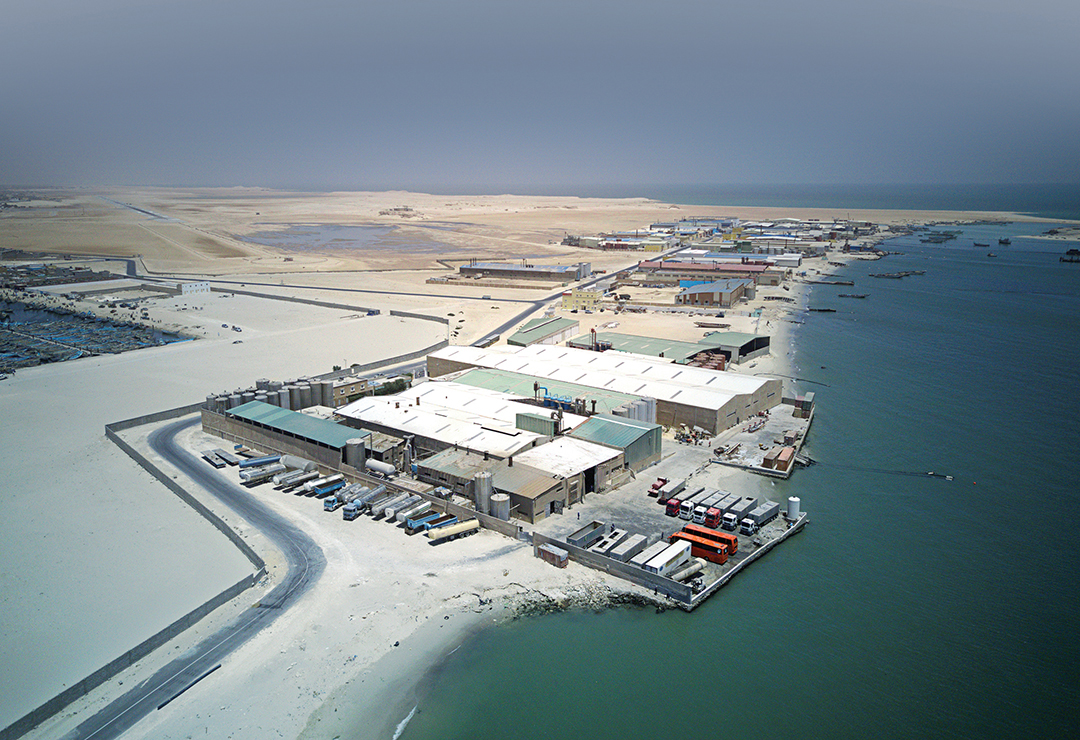
One fish species, sardinella, is prevalent in the region and common in local diets. The increased capacity of Chinese vessels to extract those migratory fish from its base in Mauritania will spell trouble for other African nations — Senegal, The Gambia, Ghana and Liberia — that also depend on it for artisanal fishing employment and to feed large swaths of their populations, CSIS reported.
“If we don’t do anything about this problem, we’re really dealing with a challenge on two levels,” Dr. Whitley Saumweber, director of the center’s Stephenson Ocean Security Project, said in the video. “We’re dealing with the challenge of developing coastal states, a challenge that affects their sovereignty, sustainability and security. Sovereignty because they’re losing access to their own natural wealth and control over that natural wealth. Sustainability because they’re losing the ability to manage those resources in a sustainable way. And security because of the potential damage that that lack of management will have for a resource that’s critical to their own food security needs and potential development opportunities.”
THE REACH OF THE FLEET
The size of China’s DWF is open to debate, but the most conservative estimates put it at roughly 3,000 vessels strong. According to China Dialogue Ocean, the fleet, which benefits from significant fuel subsidies, was scooping up 2 million metric tons of fish per year by the end of 2018. The enormous catch provides food to China’s 1.4 billion people, and some is ground into fishmeal for use as aquaculture feed.
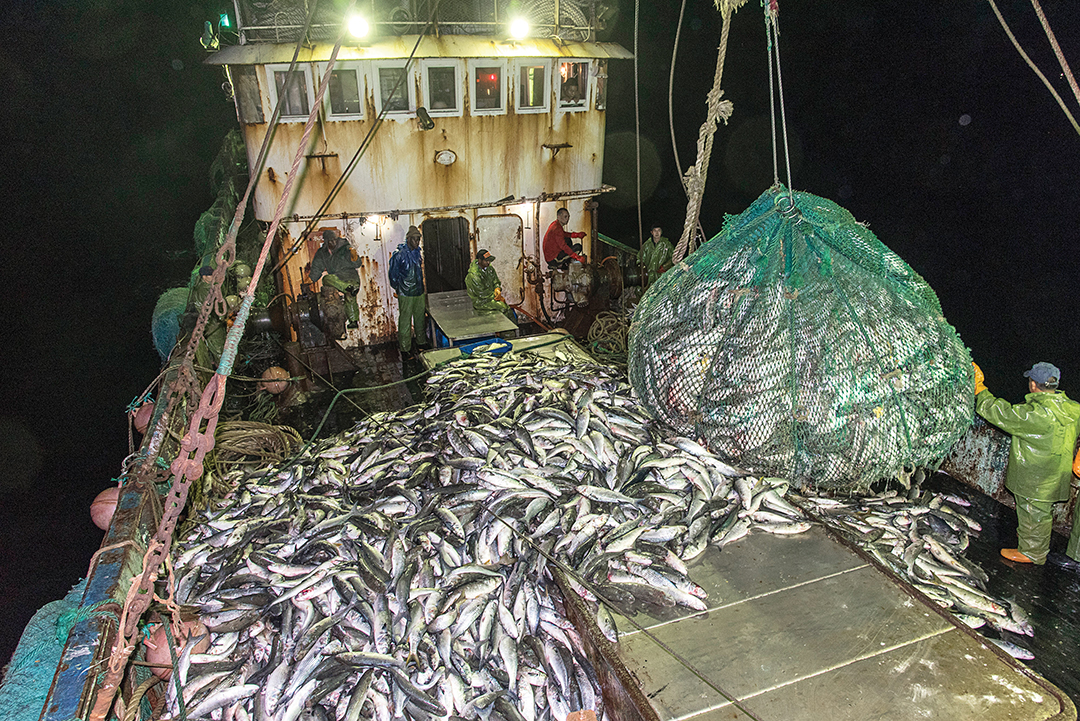
China’s DWF is a particular threat to Africa, but it is not limited to its shores. The fleet has drained seas near North Korea, throughout Asia and even near South America. Over the course of several years, it stalked the waters off the 21 volcanic land masses that comprise the Galápagos Islands. The famed archipelago, which speckles the Pacific Ocean off the coast of Ecuador, is the natural birthplace of Darwinian evolution.
It was while sailing on the HMS Beagle that a young Charles Darwin filled his notebooks with observations of the numerous tortoises and finches that lived on the pristine islands.
About 185 years later, the islands again attracted ships carrying men infatuated with wildlife. But they did not seek to fill notebooks with sketches and observations. Instead, they stuffed rusty, salt-crusted cargo holds with indiscriminate amounts of fish and seafood.
In July 2020, a huge fleet of Chinese fishing vessels — at one point numbering more than 350 — began pillaging the sea just outside the island chain’s 200-nautical mile exclusive economic zone (EEZ) before leaving in mid-October 2020. The presence was neither new nor surprising. In August 2017, the Chinese-flagged Fu Yuan Yu Leng 999 refrigerated ship was found near the islands with about 300 tons “of rare, near extinct or endangered species onboard, including 600 sharks,” according to an article by maritime experts Dr. Tabitha Mallory and Dr. Ian Ralby for the Center of International Maritime Security.
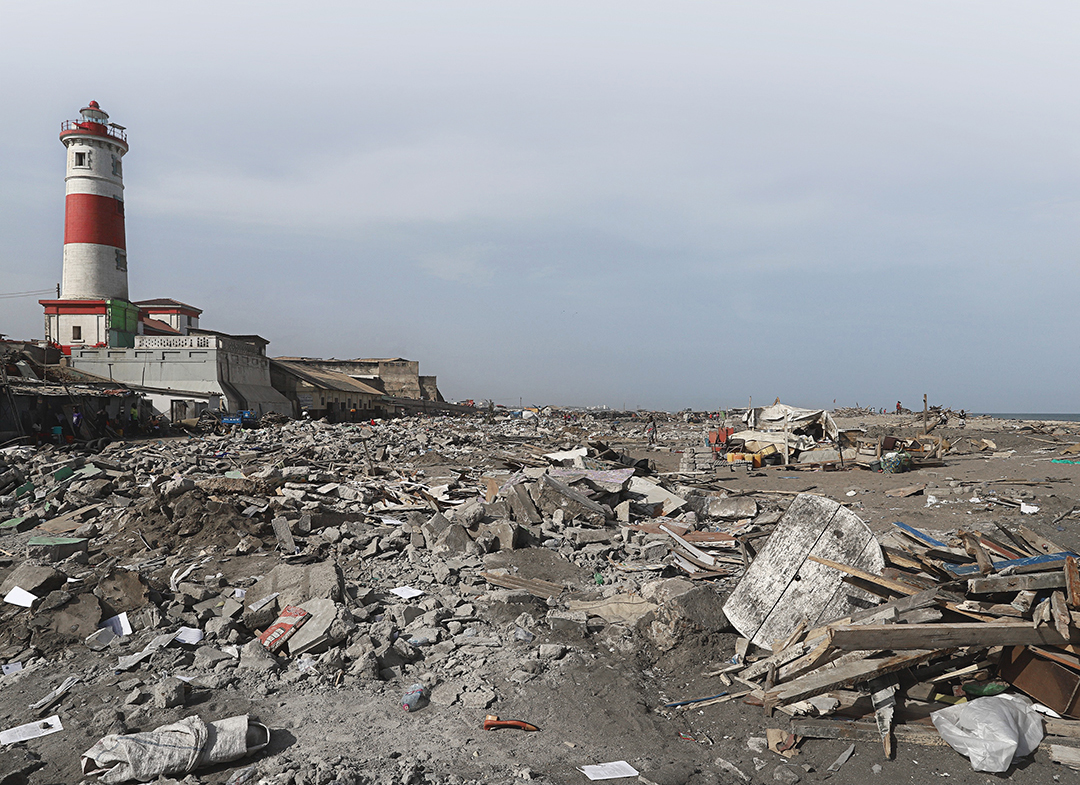
A Chinese presence near the islands can be traced to 2016 when 191 vessels began to prowl outside the Galápagos’ EEZ — up from one detected a year earlier, according to Mallory and Ralby. They wrote that China’s fishing presence near the islands grew to 298 vessels in 2019.
China’s presence in waters nearly 15,000 kilometers from its Pacific shore illustrates the nation’s willingness to span the globe for seafood to feed its population. Having long since depleted nearby stocks, the nation’s DWF isn’t limited to the Pacific. Despite the estimate that about 3,000 Chinese vessels ply oceans from Asia, to South America to East and West Africa, a study by the Overseas Development Institute has placed the size of the DWF at closer to 17,000 boats. But Mallory has written that the global fleet probably is no higher than 4,000 vessels, as most of the ships counted in the institute’s study stay in the near seas surrounding China.
With this highly subsidized, far-flung armada comes a network of supporting mechanisms and infrastructure that further embeds the fishing fleet into every global maritime region. The port in Nouadhibou is but one example in Africa. “It is hard to even think about a port city in the Gulf of Guinea and the western seaboard of Africa in general that does not have some kind of fingerprint of China on it,” Ralby, CEO of I.R. Consilium, told ADF in an email.
South of Mauritania in the Gulf of Guinea, China in 2018 signed a $50 million deal with Ghana to demolish and redevelop the historic Jamestown fishing village as a modern port complex with berths, a seawall and breakwater, as well as production, administration and support facilities, according to Ghana News Agency.
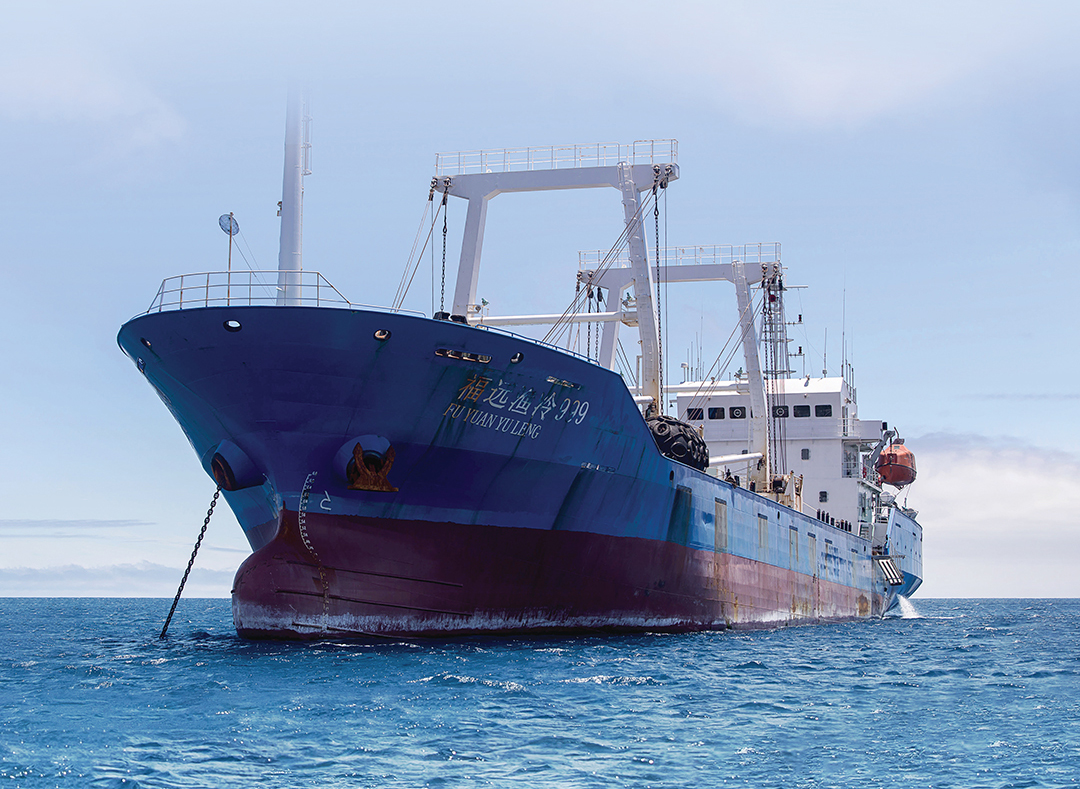
The project called for dredging 118,000 cubic meters from the harbor and shipping channels. Where once only artisanal canoes plied the waters with nets, larger vessels soon will be able to dock and offload their enormous catches.
The project has disrupted Ghana’s coastal culture. The Jamestown fishing village, where an old lighthouse still stands sentinel, was a cohesive community in which children romped with makeshift playthings and soccer balls while men ventured out in wood-carved canoes, ever farther with time, to make their catches. Women smoked the fish and dried it on concrete pads and pounded fufu — a dough made with cassava — in large mortars with pestles.
Demolition began in May 2020 in the mostly poor, densely populated enclave when local workers razed more than 300 temporary and permanent structures, including businesses, a school and houses of worship, according to Voice of America. The project is expected to be completed in early 2023.
Ghanaian authorities told VOA that those who lost property will be compensated, and the displaced will be relocated.
“When the fishing harbor is constructed, it is going to boost the economic life of this community and that is what will change the lives of a lot of people in the community,” said Seth Raymond Tetteh, chairman of the Ashiedu Keteke Sub Metro district council of the Accra Metropolitan Assembly.
The BRI is closely tied to China’s DWF and is just one of the infrastructure program’s conduits for moving a range of resources — including fisheries resources — out of nations and into the Chinese economy. In short, Ralby said, China’s work to build ports is part of its BRI strategy and its “general global influence strategy.”
The Chinese investments, which often leave African nations drowning in debt, bring with them a sense of entitlement and leverage. “I think that the port construction plan of China writ large is about buying a foothold and buying access through a global maritime presence,” Ralby said.
SECURITY AND INTIMIDATION
As China’s attempted hegemony extends beyond its own maritime borders and the South China Sea region, observers also see increased evidence of a militarized DWF, protected and advanced by the presence of the People’s Armed Forces Maritime Militia. It sometimes sails on rusty fishing boats and adds a note of intimidation to those who would challenge China’s new imperialist reach. Such military tactics primarily are seen in the South China Sea and in the near Pacific, Ralby said, and illustrate China’s willingness to involve all elements of society in its global strategy.
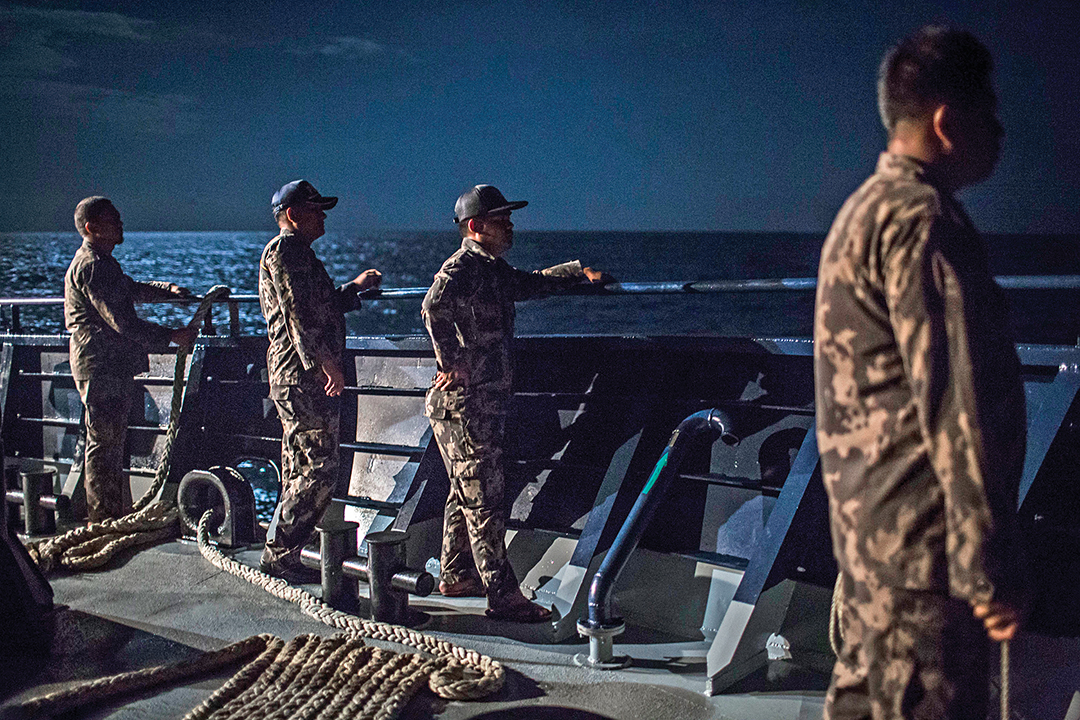
“That means that whether it’s militarized, nationalized in some respect, or heavily financed by the government through subsidies, the fishing fleet tends to end up being an arm of the Chinese state,” Ralby said. “And, with respect to illegal fishing, it is increasingly difficult to discern where the state ends and the criminal begins. That blurry line is a real challenge. And from a security standpoint, it also means that through its fishing fleet, China has eyes and ears on the water whose insights and very presence can help facilitate a wide spectrum of activities.”
This problem is illustrated by incursions near Indonesia’s Natuna Islands in which Chinese Coast Guard vessels escorted Chinese fishing trawlers into Indonesia’s EEZ to fish. China’s government admitted that its boats had entered the EEZ in December 2019, but it claimed unspecified “traditional fishing rights” and “maritime rights” in the region, according to The Diplomat, an online magazine.
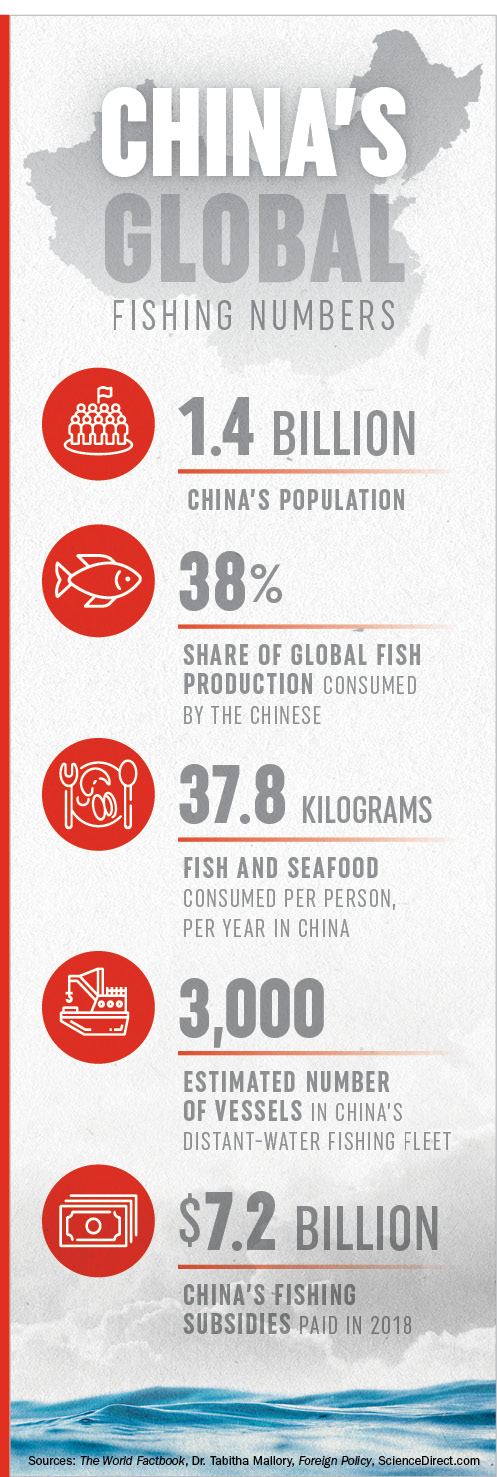 “This state-protected illegal fishing means that at least some of the illegal fishing is being done with the color of Chinese legitimacy, and the states in which it is occurring are being forced to confront not merely criminals, but the Chinese government in order to stop it,” Ralby told ADF.
“This state-protected illegal fishing means that at least some of the illegal fishing is being done with the color of Chinese legitimacy, and the states in which it is occurring are being forced to confront not merely criminals, but the Chinese government in order to stop it,” Ralby told ADF.
Although such heavy-handedness isn’t happening yet in West Africa, China does use commercial and diplomatic pressure in support of certain illicit and unsustainable practices, Ralby said. Recent examples show that if a Chinese vessel is involved in any incident — such as being arrested for fishing violations or victimized by pirates — the Chinese defense attache and ambassador stationed in that African country will be in the relevant government minister’s office “within moments.”
“The speed with which the government becomes actively involved is rather striking,” Ralby said.

